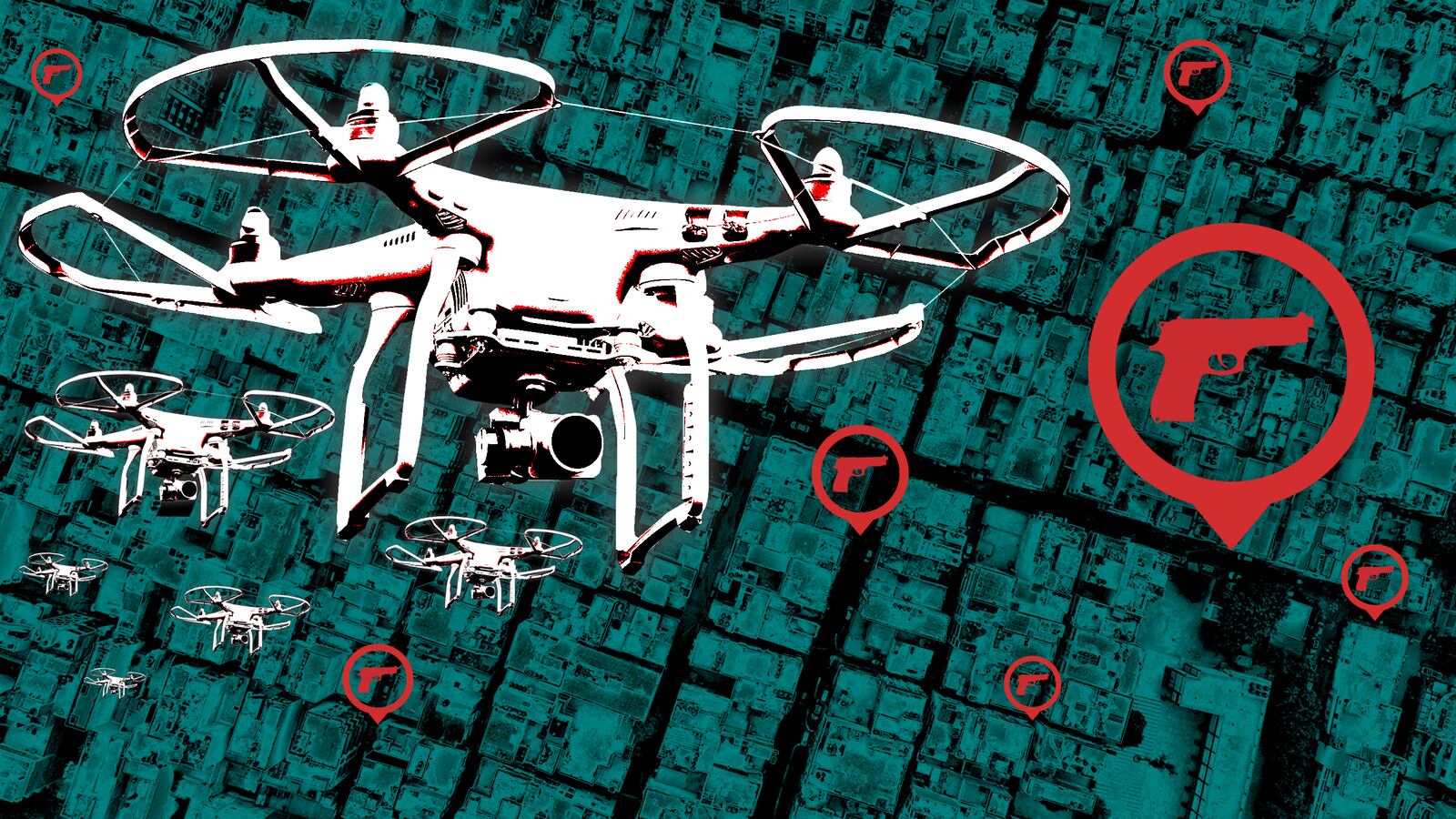The first responder to gunfire in Louisville, Kentucky, could soon be a drone.
Louisville is pushing a program that would connect drones to ShotSpotter, a program that listens for gunsfire through microphones placed throughout the city. The proposed program, first reported by the city’s WDRB, could make the city safer, Louisville officials say. But privacy advocates are skeptical of the tech, which they warn could push surveillance on locals.
ShotSpotter is a software by a publicly traded company of the same name. The pricey software (Louisville shelled out more than $1.2 million for a subscription in 2017) calculates the gunshot’s location by triangulating it off the three nearest microphones, and sends an alert to police. The system has seen recent adoption in major cities, including New York and Washington, D.C.
Louisville is poised to take the software even further. It’s one of 300 cities to apply for the FAA’s U.S. Unmanned Aerial System Integration Pilot Program, a federal program that pairs local governments with private drone companies for projects. But it appears to be the only city proposing to link drones up with ShotSpotter, automatically deploying the surveillance craft to the scene of a possible gunshot.
The drone-mounted cameras could actually be a boon to privacy, Louisville’s head of innovation said.
“From my perspective, actually having the city blanketed in stationary cameras is a bigger privacy concern since those cameras are always on and always rolling,” the city’s Metro Chief of Civic Innovation Grace Simrall told WDRB. “We concluded that if we could leverage camera technology, we could get much faster to the scene of a crime, specifically the detection of a gunshot.”
The proposed program comes less than a year after Louisville rolled out ShotSpotter. The city has not revealed the exact locations of its microphones, telling the city’s WFPL that doing so would “threaten public safety.” Police later told WAVE 3 News that most had been placed in neighborhoods that saw more gun violence. A resident in one of neighborhoods told WFPL he witnessed technicians installing the microphones outside homes, but that technicians refused to tell him what the device was, calling it “fiber optics.”
Rachel Levinson-Waldman, a senior counsel at the Brennan Center for Justice said the program could lead to disproportionate surveillance of low-income communities.
In the past, ShotSpotter technology was “deployed more in minority neighborhoods or more socio-economically disadvantaged neighborhoods,” she told The Daily Beast. “Similarly, it seems quite likely that these are the neighborhoods that are going to end up with these drones flying overhead, and drones that are collecting information for police purposes, but are being collected by a private third-party company, which may have even less accountability in some ways.”
Levinson-Waldman emphasized that individual communities should be consulted on whether they thought ShotSpotter and drones are “a good use of public money and police resources,” or if they’d rather see the city put money into other programs like social services.
Cities’ secrecy over ShotSpotter locations, and the potential for ShotSpotter to disproportionately surveil specific neighborhoods, are among a list of activist concerns about the technology. In 2012, the American Civil Liberties Union expressed concern over the microphones’ apparent ability to record conversations.
“It is not generally legal for law enforcement (or anyone else) to make audio recordings of conversations in which they are not a participant without a warrant,” ACLU Senior Policy Analyst Jay Stanley wrote for the organization. Stanley cited a New York Times report about ShotSpotter recording two men’s argument before a fatal shooting. ShotSpotter officials told the Times it was “extremely rare” for the microphones to record voices.
There’s also the question of whether ShotSpotter gets results. A 2016 Forbes analysis of ShotSpotter data in more than two dozen cities found that most ShotSpotter reports ended with police closing the cases as “unfounded,” or with officers “unable to locate” a shot, or similar language that indicated a dead end in the case. From 2013 to mid-2015, San Francisco’s ShotSpotter system sent 4,385 alerts. Only two resulted in arrests, Forbes found.
The ShotSpotter algorithm is supposed to filter out other loud noises like fireworks, construction, or backfiring cars. But it isn’t always successful. An independent, ShotSpotter-funded study found the program recorded a huge surge in supposed gunfire on New Year’s Eve and July 4, suggesting the program was confusing fireworks for gunfights (PDF).
Louisville’s ShotSpotter system has only seen one New Year’s Eve. But that night, from 11 p.m. on New Years Eve 2017 until 8 a.m. on New Year’s Day 2018, the system logged 465 gunshots, police told the city’s WAVE 3 News. Police did not clarify whether those reports were all gunshots, or if the sound of fireworks might have inflated the figure.
None of the 465 reports resulted in arrests.
But if Louisville’s program receives FAA approval, those reports could result in a visit from a drone, inviting a new set of privacy concerns. Louisville officials told WDRB the drones’ footage would only stream to the city’s police force.
It’s not clear how Louisville police would store or handle the footage after it’s collected. After rolling out ShotSpotter in summer 2017, Louisville Metro Police Chief Steve Conrad told reporters he was hoping to add more high-tech video equipment to the department’s arsenal, including license plate readers, and facial recognition software for surveillance cameras.
“When you think about drones specifically, instead of having a camera that’s always on, and could collect audio that’s not just a gunshot, I can see why a drone seems to mitigate some of those concerns,” Levinson-Waldman said. “By the same token, when we’re having this discussion about policing and technology and over-reliance on technology, it’s hard to think of a more visible example of that than suddenly having a drone circling overhead.
“I think if nothing else, this doesn’t seem like a great public look.”






